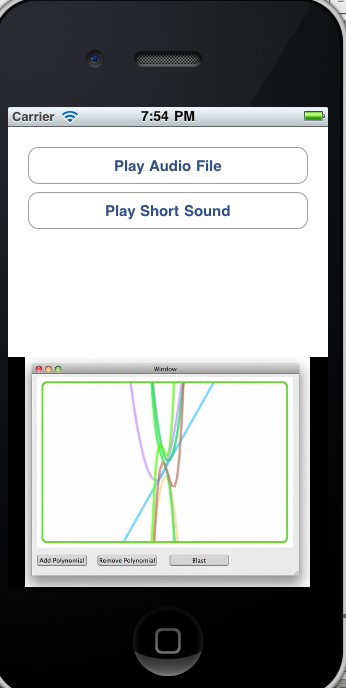iOS sdk中提供了很多方便的方法来播放多媒体。本文将利用这些SDK做一个demo,来讲述一下如何使用它们来播放音频文件。
AudioToolbox framework
使用AudioToolbox framework。这个框架可以将比较短的声音注册到 system sound服务上。被注册到system sound服务上的声音称之为 system sounds。它必须满足下面几个条件。
1、 播放的时间不能超过30秒
2、数据必须是 PCM或者IMA4流格式
3、必须被打包成下面三个格式之一:Core Audio Format (.caf), Waveform audio (.wav), 或者 Audio Interchange File (.aiff)
声音文件必须放到设备的本地文件夹下面。通过AudioServicesCreateSystemSoundID方法注册这个声音文件,AudioServicesCreateSystemSoundID需要声音文件的url的CFURLRef对象。看下面注册代码:
#import <AudioToolbox/AudioToolbox.h> @interface MediaPlayerViewController : UIViewController { IBOutlet UIButton *audioButton; SystemSoundID shortSound; }
- (id)init { self = [super initWithNibName:@"MediaPlayerViewController" bundle:nil]; if (self) { // Get the full path of Sound12.aif NSString *soundPath = [[NSBundle mainBundle] pathForResource:@"Sound12" ofType:@"aif"]; // If this file is actually in the bundle... if (soundPath) { // Create a file URL with this path NSURL *soundURL = [NSURL fileURLWithPath:soundPath]; // Register sound file located at that URL as a system sound OSStatus err = AudioServicesCreateSystemSoundID((CFURLRef)soundURL, &shortSound); if (err != kAudioServicesNoError) NSLog(@"Could not load %@, error code: %d", soundURL, err); } } return self; }
这样就可以使用下面代码播放声音了:
- (IBAction)playShortSound:(id)sender { AudioServicesPlaySystemSound(shortSound); }
使用下面代码,还加一个震动的效果:
- (IBAction)playShortSound:(id)sender { AudioServicesPlaySystemSound(shortSound); AudioServicesPlaySystemSound(kSystemSoundID_Vibrate); }
AVFoundation framework
对于压缩过Audio文件,或者超过30秒的音频文件,可以使用AVAudioPlayer类。这个类定义在AVFoundation framework中。
下面我们使用这个类播放一个mp3的音频文件。首先要引入AVFoundation framework,然后MediaPlayerViewController.h中添加下面代码:
#import <AVFoundation/AVFoundation.h> @interface MediaPlayerViewController : UIViewController <AVAudioPlayerDelegate> { IBOutlet UIButton *audioButton; SystemSoundID shortSound; AVAudioPlayer *audioPlayer;
AVAudioPlayer类也是需要知道音频文件的路径,使用下面代码创建一个AVAudioPlayer实例:
- (id)init { self = [super initWithNibName:@"MediaPlayerViewController" bundle:nil]; if (self) { NSString *musicPath = [[NSBundle mainBundle] pathForResource:@"Music" ofType:@"mp3"]; if (musicPath) { NSURL *musicURL = [NSURL fileURLWithPath:musicPath]; audioPlayer = [[AVAudioPlayer alloc] initWithContentsOfURL:musicURL error:nil]; [audioPlayer setDelegate:self]; } NSString *soundPath = [[NSBundle mainBundle] pathForResource:@"Sound12" ofType:@"aif"];
我们可以在一个button的点击事件中开始播放这个mp3文件,如:
- (IBAction)playAudioFile:(id)sender { if ([audioPlayer isPlaying]) { // Stop playing audio and change text of button [audioPlayer stop]; [sender setTitle:@"Play Audio File" forState:UIControlStateNormal]; } else { // Start playing audio and change text of button so // user can tap to stop playback [audioPlayer play]; [sender setTitle:@"Stop Audio File" forState:UIControlStateNormal]; } }
这样运行我们的程序,就可以播放音乐了。
这个类对应的AVAudioPlayerDelegate有两个委托方法。一个是 audioPlayerDidFinishPlaying:successfully: 当音频播放完成之后触发。当播放完成之后,可以将播放按钮的文本重新回设置成:Play Audio File
- (void)audioPlayerDidFinishPlaying:(AVAudioPlayer *)player successfully:(BOOL)flag { [audioButton setTitle:@"Play Audio File" forState:UIControlStateNormal]; }
另一个是audioPlayerEndInterruption:,当程序被应用外部打断之后,重新回到应用程序的时候触发。在这里当回到此应用程序的时候,继续播放音乐。
- (void)audioPlayerEndInterruption:(AVAudioPlayer *)player { [audioPlayer play]; }
MediaPlayer framework
播放电影文件:
iOS sdk中可以使用MPMoviePlayerController来播放电影文件。但是在iOS设备上播放电影文件有严格的格式要求,只能播放下面两个格式的电影文件。
• H.264 (Baseline Profile Level 3.0)
• MPEG-4 Part 2 video (Simple Profile)
幸运的是你可以先使用iTunes将文件转换成上面两个格式。
MPMoviePlayerController还可以播放互联网上的视频文件。但是建议你先将视频文件下载到本地,然后播放。如果你不这样做,iOS可能会拒绝播放很大的视频文件。
这个类定义在MediaPlayer framework中。在你的应用程序中,先添加这个引用,然后修改MediaPlayerViewController.h文件。
#import <MediaPlayer/MediaPlayer.h> @interface MediaPlayerViewController : UIViewController <AVAudioPlayerDelegate> { MPMoviePlayerController *moviePlayer;
下面我们使用这个类来播放一个.m4v 格式的视频文件。与前面的类似,需要一个url路径。
- (id)init { self = [super initWithNibName:@"MediaPlayerViewController" bundle:nil]; if (self) { NSString *moviePath = [[NSBundle mainBundle] pathForResource:@"Layers" ofType:@"m4v"]; if (moviePath) { NSURL *movieURL = [NSURL fileURLWithPath:moviePath]; moviePlayer = [[MPMoviePlayerController alloc] initWithContentURL:movieURL]; }
MPMoviePlayerController有一个视图来展示播放器控件,我们在viewDidLoad方法中,将这个播放器展示出来。
- (void)viewDidLoad { [[self view] addSubview:[moviePlayer view]]; float halfHeight = [[self view] bounds].size.height / 2.0; float width = [[self view] bounds].size.width; [[moviePlayer view] setFrame:CGRectMake(0, halfHeight, width, halfHeight)]; }
还有一个MPMoviePlayerViewController类,用于全屏播放视频文件,用法和MPMoviePlayerController一样。
MPMoviePlayerViewController *playerViewController = [[MPMoviePlayerViewController alloc] initWithContentURL:movieURL]; [viewController presentMoviePlayerViewControllerAnimated:playerViewController];
我们在听音乐的时候,可以用iphone做其他的事情,这个时候需要播放器在后台也能运行,我们只需要在应用程序中做个简单的设置就行了。
1、在Info property list中加一个 Required background modes节点,它是一个数组,将第一项设置成设置App plays audio。
2、在播放mp3的代码中加入下面代码:
if (musicPath) { NSURL *musicURL = [NSURL fileURLWithPath:musicPath]; [[AVAudioSession sharedInstance] setCategory:AVAudioSessionCategoryPlayback error:nil]; audioPlayer = [[AVAudioPlayer alloc] initWithContentsOfURL:musicURL error:nil]; [audioPlayer setDelegate:self]; }
在后台运行的播放音乐的功能在模拟器中看不出来,只有在真机上看效果。

总结:本文通过例子详细讲解了iOS sdk中用于播放音频文件的类,文章后面有本文的代码提供下载。
代码:点击打开链接




















 105
105











 被折叠的 条评论
为什么被折叠?
被折叠的 条评论
为什么被折叠?








